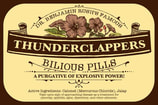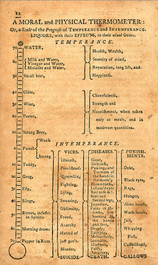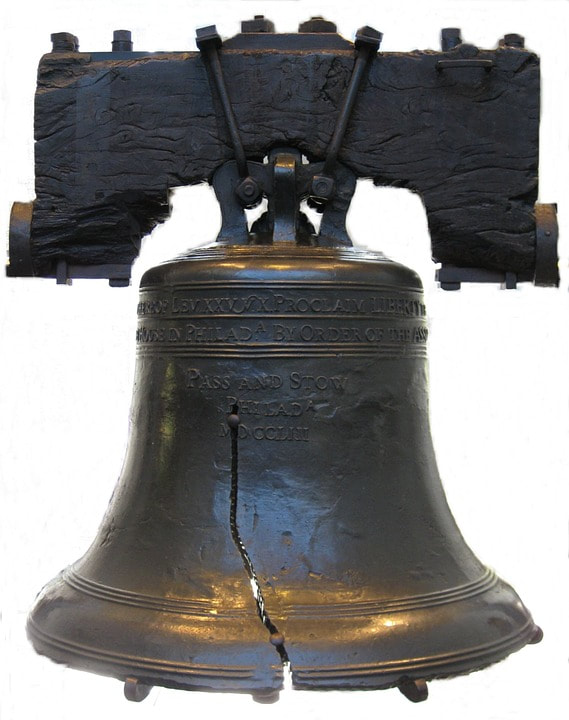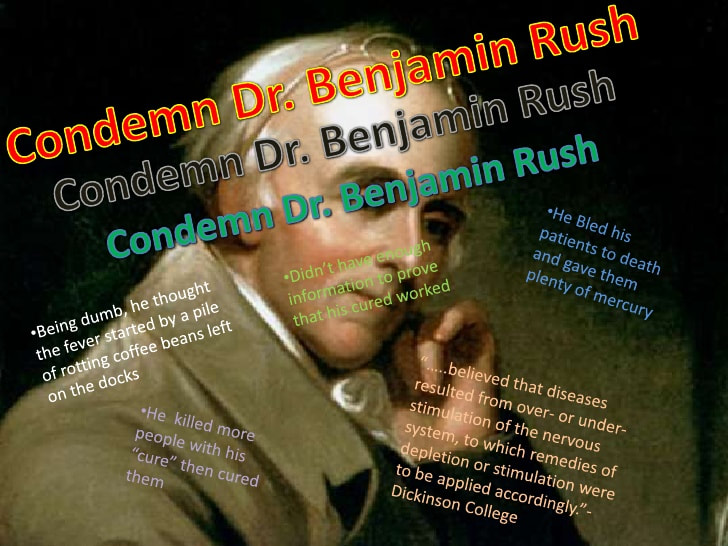He criticized General George Washington's leadership skills during the Revolutionary War, and some claim it was Rush's bilious pills that killed George Washington in 1799.
Rush had bold opinions. Thomas Paine consulted Dr. Rush when writing his persuasive pamphlet Common Sense.
Notable is the fact that Benjamin Rush was a doctor who made aggressive prescriptions for his patients, both for their physical ailments and for their mental/emotional ones.
(LIBERTY) BELL WORK
He Signed
BloodLetting Benjamin Rush seems unafraid and unapologetic in his methods and beliefs. Dr. Rush was certainly a proponent of bloodletting. The idea behind bloodletting it that if enough of the diseased blood was removed from the body, the body could better fight the remaining disease. On the surface, it made sense. Even the traditional barber pole tells the story of when barbers extracted teeth and performed bloodletting on their customers. It also played into the thinking of the time that the more products of the body that could be let, the better. Rush devised pills that forced a body into thunderous bouts of diarrhea. He wanted a sick body to relieve itself of all the urine, bile, vomit, and sweat as possible. In this way, all the evil spirits would also leave the body. Finally, Dr. Rush was a surgeon. On that note, we have a task ahead of us that also involves surgery. Get ready to enter the operating room! He Taught Dr. Rush trained thousands of future physicians, but perhaps his most well-known student was Meriwether Lewis who was soon to lead the first scientific expedition funded by the United States. Among other medicines, fifty dozen of Dr. Rush's Thunderclappers found their way into Lewis's medical "bag". These bilious pills had enough mercury in them that archeologists have been able to trace the Corps of Discovery's trail to the west and discovery exact locations for their overnight camps - by finding their latrines along the way. Some questions:
Read more about Medicine and Health on the Lewis and Clark Expedition. DiscussSome people would condemn Dr. Rush for his medical beliefs and subsequent practices. Are charges like these justified? | Yellow FeverPerhaps Dr. Rush's views of expelling disease are most obvious in his treatment during the Yellow Fever epidemic. SmallPoxIn a time before people were accustomed to getting vaccinations to avoid diseases, Dr. Rush was heralding such actions. How frightening is it to consider purposely putting a bit of the unwanted disease into the body to force the body to fight it. Then, the body could forever resist the same disease. We will talk more about his treatment of smallpox later in the year. Father of American Psychiatry Rush used what he knew (or thought he knew) about the body and the circulation of blood to focus his attention on the mind. As an aside, Rush created the primary source (right) to display his beliefs about alcohol's effects on mood and emotion. Dr. Rush's interests led him to create many methods for treating people who would today be diagnosed with insanity, autism, Down's Syndrome, and other issues. Some of his methods were highly unorthodox; many even seem inhumane. As unbelievable as these methods are, they were the precursors to the methods used today in clinics, schools, and special facilities. And today, for his work and research, Dr. Benjamin Rush is known the Father of American Psychiatry. The Glore Psychiatric Museum in St. Joseph, Missouri, is a testament to the work of Dr. Rush and others and their attempts to understanding mental inefficacies. Music AppreciationEnjoy these songs as you try to find their connections to Dr. Benjamin Rush. |


















































